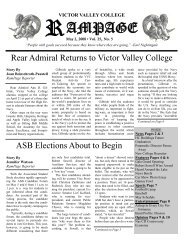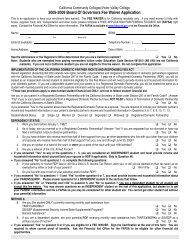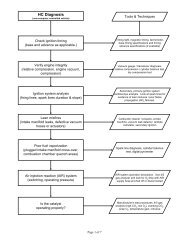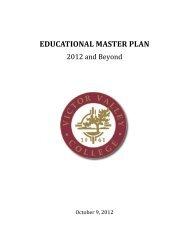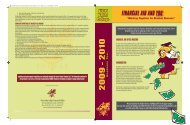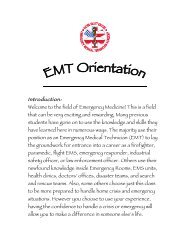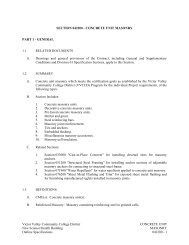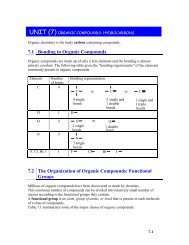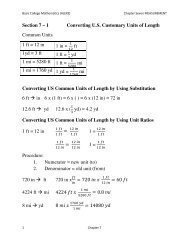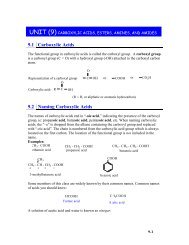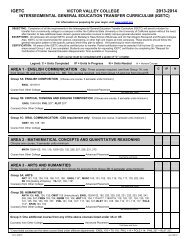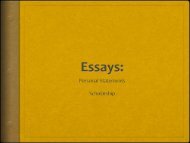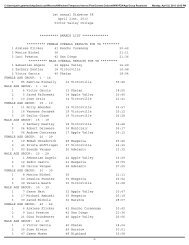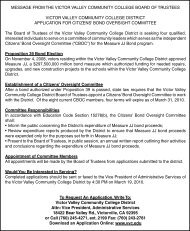Download - Victor Valley College
Download - Victor Valley College
Download - Victor Valley College
You also want an ePaper? Increase the reach of your titles
YUMPU automatically turns print PDFs into web optimized ePapers that Google loves.
PROGRAMS / COURSE DESCRIPTION<br />
and windbreak trees that are adapted to local climatic<br />
conditions and that meet particular landscaping<br />
objectives. Emphasis will be on choosing the right type<br />
of tree for the location, optimizing site selection, soil<br />
preparation and planting, efficient irrigation practices,<br />
establishing a home orchard, and tree health,<br />
maintenance and pruning.<br />
Learn to remodel a landscape to make it more resource<br />
efficient and attractive. Emphasis will be on redesigning<br />
and planning, water-saving approaches for lawn areas,<br />
low-maintenance alternatives to lawn areas, utilization<br />
of existing landscape elements, salvaging trees and<br />
shrubs by pruning and retraining and introduction of new<br />
landscape elements that are readily established.<br />
AGRICULTURE • NATURAL RESOURCES<br />
AGNR 61C RECYCLING THE NATURAL WAY:<br />
ESSENTIALS OF COMPOSTING<br />
Units: 0.5 - 8-9 hours lecture. (No prerequisite. Grade<br />
Option)<br />
Learn how to make productive use of unwanted yard<br />
waste and other materials through the Master<br />
Composter Program. Topics include: benefits of<br />
composting; the biological process of composting;<br />
materials that can and cannot be composted; types of<br />
composting units and how to establish and manage<br />
them; vermiculture; using the finished product as a soil<br />
conditioner or mulch, using other solid waste such as<br />
straw and concrete in the landscape.<br />
AGNR 61D DESIGNING DRIP IRRIGATION AND<br />
OTHER WATER EFFICIENT SYSTEMS<br />
Units: 0.5 - 8-9 hours lecture. (No prerequisite. Grade<br />
Option)<br />
Students will learn to design, install, and maintain drip<br />
and other water-efficient landscape irrigation systems.<br />
Topics include: system layout; description of available<br />
irrigation hardware components and their use;<br />
converting existing systems to be water-efficient;<br />
adapting an existing system to a redesigned landscape;<br />
effective use of timers and controllers based on<br />
seasonal water requirements; troubleshooting and<br />
repair.<br />
AGNR 61E ORGANIC METHODS FOR<br />
GARDENING AND LANDSCAPING<br />
Units: 0.5 - 8-9 hours lecture. (No prerequisite. Grade<br />
Option)<br />
Introduction to the use of organic methods in cultivating<br />
vegetables, herbs, flowers, shrubs, and trees. Students<br />
will learn to evaluate basic soil characteristics and<br />
assess the need for soil amendments and fertilizers.<br />
Other topics include: assessing plant health; organic<br />
and natural soil amendments and fertilizers; selecting<br />
and sourcing native and climate-adapted plant<br />
materials; plant pests and natural methods for<br />
controlling them.<br />
AGNR 61F OUTDOOR REMODELING:<br />
APPROACHES TO LANDSCAPE CONVERSION<br />
Units: 0.5 -8-9 hours lecture. (No prerequisite. Grade<br />
Option)<br />
AGNR 61G INTEGRATED PEST MANAGEMENT FOR<br />
THE LANDSCAPE AND HOME<br />
Units: 0.5 - 8-9 hours lecture. (No prerequisite. Grade<br />
Option)<br />
Managing pests with an integrated approach using<br />
knowledge of their habits and life histories to determine<br />
the best method or combination of methods for<br />
controlling them. Students will learn about the biology of<br />
pest organisms (weeds, insects, plant diseases,<br />
rodents, and other pests), preventing the establishment<br />
of pests before they become a problem, evaluating the<br />
effects of pests on plant health, and methods of pest<br />
control, with emphasis on low-impact practices and safe<br />
handling of chemical treatment.<br />
AGNR 61H NATURAL LANDSCAPES:<br />
CREATING A CUSTOM HABITAT<br />
Units: 0.5 - 8-9 hours lecture. (No prerequisite. Grade<br />
Option)<br />
Design a landscape that incorporates natural practices<br />
to create a custom habitat. Includes Habitat Gardening:<br />
plants that attract desirable wildlife such as birds and<br />
butterflies; edible landscapes; incorporating vegetables,<br />
herbs, and fruit trees; planting for seasonal color;<br />
allergy-free landscaping; creating outdoor living spaces;<br />
integrating hardscape elements such as decks,<br />
gazebos, and rockscapes into the design.<br />
AGNR 72 GEOSPATIAL TECHNOLOGY I<br />
Units: 4.0 - 64-72 hours lecture. (No prerequisite)<br />
This course examines the theory behind geographic<br />
information systems (GIS) and global positioning<br />
systems (GPS) and their application to spatial data. An<br />
interdisciplinary approach to GIS and its capability for<br />
analysis and decision-making in diverse industries.<br />
Students will use ArcGIS9 software and GPS software<br />
on real-world projects that find solutions to local<br />
problems using spatial data.<br />
AGNR 73 WATER RESOURCE MANAGEMENT<br />
Units: 3.0 - 48-54 hours lecture. (No prerequisite.<br />
Grade Option)<br />
This class is a complete overview of water resource<br />
management in the West Mojave Desert and makes<br />
appropriate linkages to the critical nature of water<br />
management around the world. Local water<br />
102 2012-2013 <strong>Victor</strong> <strong>Valley</strong> <strong>College</strong> Catalog



